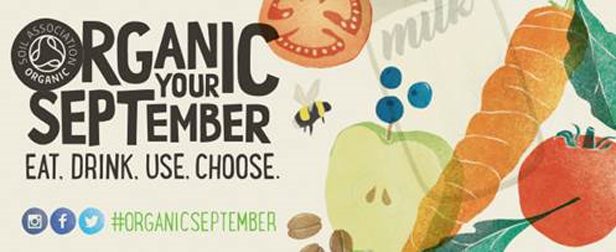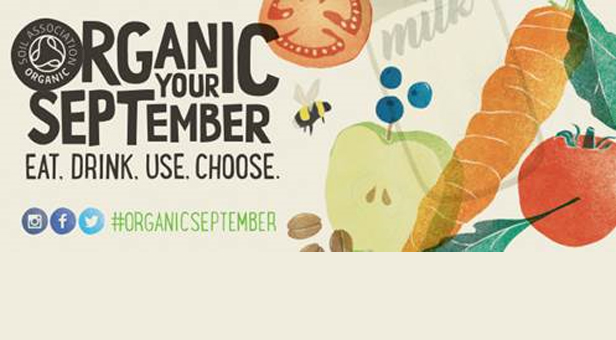
This year’s Organic September is set to be the biggest ever celebration of all things organic, with chefs, foodies and food writers all lending their support to make it easier for more people to eat and live healthier by making one small change to their shopping habits.
With new research from Mintel finding 74% of people say animal welfare is their top ethical concern for food and drink, Organic September makes it easier to make small changes which can make a big difference. If 20 families switched to organic milk, another cow will be free to range on clover rich organic pastures; if two families switched to organic bacon, one more pig will keep its curly tail and stay with its mother for much longer; and if one family switched to organic eggs, a hen would have access to grassland and not be at risk of painful beak trimming.
Brits are also increasingly opting for environmentally-friendly food that accounts for animal welfare, and nearly three quarters (72%) of adults surveyed listed quality as one of their top three concerns when purchasing meat, beating price (66%).
The Soil Association is encouraging people to ‘Organic their September’ by opting to choose organic products to make a big difference to our environment and animal welfare. People can plan their small changes with the Soil Association’s Organic 30 list and calendar, with 30 easy changes people can make to support organic. The 30 changes will show people how organic farming supports wildlife, the environment and has the best animal welfare standards, and through the Soil Association website people can share their stories about organic food and in return see how farmers are making a difference too. From organic eggs in the morning for a truly free range breakfast to grabbing a piece of organic fruit to reduce exposure to pesticides – people can choose the swaps and share their progress on social media to win prizes throughout the month.
Organic September is being supported by movers and shakers across the food industry, who have shared their must have organic item. From chefs to food writers, the Soil Association reveals their reasons for choosing organic and the items they absolutely can’t live without:
Jasmine and Melissa Hemsley of Hemsley + Hemsley: “Organic courgettes (the last of the season) for spiralizing – while they’re in season, we can’t get enough of them, apparently courgette sales are up as people loving spiralizing so much! Courgettes for us are hero vegetables and the perfect ingredient because they’re easy to spiralize, don’t require cooking and are so versatile! While they’re still in season we can’t get enough of them and enjoy eating this delicious veg in many different ways. One of our most popular recipes is Beef Ragu with Courgetti and if we want a simple snack, our Quicker Than Toast courgette salad from The Art of Eating Well goes down a treat! As the weather gets cooler, we recommend spiralizing courgettes into noodle shapes and dropping them straight into ramen-style or Pho soups to serve. Earlier this year we released our very own Hemsley Spiralizer, but you can use a julienne peeler, or regular vegetable peeler to make wide noodle shapes.”
Olia Hercules, Chef and recipe writer recently featured in The Great British Bake Off: “My go to product is chicken. I grew up in the South of Ukraine, almost exclusively on home-grown, organic produce. Getting back to my roots is my obsession, so using organic ingredients again feels more than natural. Meat provenance is extremely important to me, and I do not buy anything but organic chicken and pork. Outdoor access and lack of antibiotics and growth hormones is the type of meat that I grew up with, this is why I wouldn’t want my son to grow up any differently.”
Anna Jones, vegetarian chef, food writer and stylist: “Eggs and dairy. For me it’s especially important when it comes to eggs and dairy – you want to see the paint-pot yellow yolks, and taste the sweetness of the grass the cows have grazed on.”
Steve Edwards, MasterChef Professional Winner 2013: “Without great ingredients it’s impossible to do great dishes. As a chef you rely heavily upon the ingredients you choose so it’s important to know where they come from and the journey the have had. By choosing organic food you know that the ingredient has been treated with respect and has been grown with the environment and animal welfare in mind.”
Helen Browning, Soil Association chief executive said: “With wildlife in decline over the last half century, Organic September is a fantastic opportunity to let people know why organic farming is more important than ever. With each small change we make – like choosing organic milk or butter, or switching to organic eggs, we are helping secure a better future for animal welfare, our bees and other pollinators, and of course, our neglected soils.”
5 top tips for Organic September
1. Switch to organic milk. Organic milk is naturally different – no system of farming produces milk with higher levels of omega 3 fatty acids or a healthier balance of omega-6.
2. Eat less, but better, organic meat. Organic animals enjoy the very highest welfare standards of any farmed animals. They are fed a GM free diet and graze on organic pasture where pesticides are severely restricted.
3. Switch to organic beauty. There are currently no legal standards for organic beauty so some products may be labelled ‘organic’ even if it doesn’t always stand true. Look for the Soil Association symbol to make sure that what you put on your body is as important as what goes in it.
4. Sign up for an organic veg box. Organic farms support 50% more wildlife than non-organic farms, so you’re not just treating yourself to the best of British produce, you’re also helping to protect bees, birds and butterflies.
5. Brew an organic tea or coffee. Organic tea and coffee is grown without the use of artificial pesticides and fertilisers. This not only reduces the farmers’ exposure in the developing world, it also means healthier soils and more habitats for birds and wildlife.
The Soil Association is also partnering with independent, online and national retailers in the UK to make it easier for people to achieve their small changes. For the third year running, the Soil Association is also teaming up with 100% renewable electricity company Good Energy, working together to promote renewable energy to customers, farmers and landowners across the UK. For more information call 0800 254 0000 or visit www.goodenergy.co.uk/soil-association







